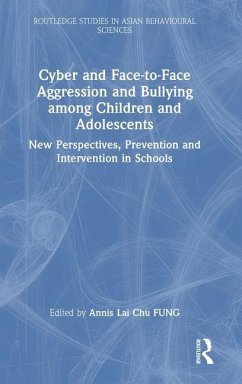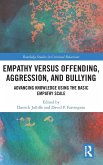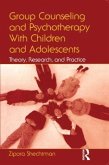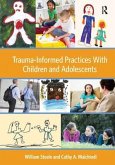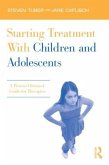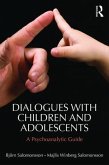Cyber and Face-to-Face Aggression and Bullying among Children and Adolescents
New Perspectives, Prevention and Intervention in Schools
Herausgeber: Fung, Annis Lai Chu
Cyber and Face-to-Face Aggression and Bullying among Children and Adolescents
New Perspectives, Prevention and Intervention in Schools
Herausgeber: Fung, Annis Lai Chu
- Gebundenes Buch
- Merkliste
- Auf die Merkliste
- Bewerten Bewerten
- Teilen
- Produkt teilen
- Produkterinnerung
- Produkterinnerung
The shift to face-to-face communication since the start of the global pandemic has resulted in more conflicts among children and adolescents on social media, and aggressive and bullying behaviour becoming more severe on online platforms such as Instagram, Facebook, Twitter, WhatsApp, and Signal.
Andere Kunden interessierten sich auch für
![The Psychology of Criminal and Antisocial Behavior The Psychology of Criminal and Antisocial Behavior]() The Psychology of Criminal and Antisocial Behavior70,99 €
The Psychology of Criminal and Antisocial Behavior70,99 €![Empathy versus Offending, Aggression and Bullying Empathy versus Offending, Aggression and Bullying]() Empathy versus Offending, Aggression and Bullying199,99 €
Empathy versus Offending, Aggression and Bullying199,99 €![School Bullying and Mental Health School Bullying and Mental Health]() School Bullying and Mental Health220,99 €
School Bullying and Mental Health220,99 €![Group Counseling and Psychotherapy With Children and Adolescents Group Counseling and Psychotherapy With Children and Adolescents]() Zipora ShechtmanGroup Counseling and Psychotherapy With Children and Adolescents75,99 €
Zipora ShechtmanGroup Counseling and Psychotherapy With Children and Adolescents75,99 €![Trauma-Informed Practices With Children and Adolescents Trauma-Informed Practices With Children and Adolescents]() William SteeleTrauma-Informed Practices With Children and Adolescents240,99 €
William SteeleTrauma-Informed Practices With Children and Adolescents240,99 €![Starting Treatment With Children and Adolescents Starting Treatment With Children and Adolescents]() Steven TuberStarting Treatment With Children and Adolescents210,99 €
Steven TuberStarting Treatment With Children and Adolescents210,99 €![Dialogues with Children and Adolescents Dialogues with Children and Adolescents]() Björn SalomonssonDialogues with Children and Adolescents66,99 €
Björn SalomonssonDialogues with Children and Adolescents66,99 €-
-
-
The shift to face-to-face communication since the start of the global pandemic has resulted in more conflicts among children and adolescents on social media, and aggressive and bullying behaviour becoming more severe on online platforms such as Instagram, Facebook, Twitter, WhatsApp, and Signal.
Hinweis: Dieser Artikel kann nur an eine deutsche Lieferadresse ausgeliefert werden.
Hinweis: Dieser Artikel kann nur an eine deutsche Lieferadresse ausgeliefert werden.
Produktdetails
- Produktdetails
- Verlag: Routledge
- Seitenzahl: 202
- Erscheinungstermin: 5. März 2024
- Englisch
- Abmessung: 240mm x 161mm x 16mm
- Gewicht: 473g
- ISBN-13: 9781032540542
- ISBN-10: 1032540540
- Artikelnr.: 69482932
- Herstellerkennzeichnung
- Libri GmbH
- Europaallee 1
- 36244 Bad Hersfeld
- gpsr@libri.de
- Verlag: Routledge
- Seitenzahl: 202
- Erscheinungstermin: 5. März 2024
- Englisch
- Abmessung: 240mm x 161mm x 16mm
- Gewicht: 473g
- ISBN-13: 9781032540542
- ISBN-10: 1032540540
- Artikelnr.: 69482932
- Herstellerkennzeichnung
- Libri GmbH
- Europaallee 1
- 36244 Bad Hersfeld
- gpsr@libri.de
Annis Lai Chu FUNG, Ph.D., is currently an Associate Professor at the Department of Social and Behavioral Sciences at the City University of Hong Kong, Hong Kong, China. Her research and teaching areas are children and youth in school bullying, aggressive behaviour, peer victimisation, and innovative counselling interventions. She established the Children and Adolescents at Risk Education Laboratory (C.A.R.E. Lab.), which focuses on developing and scientifically evaluating various original interventions to reduce face-to-face aggression and bullying. Approaches such as the cognitive-behavioural approach, the physio-moral approach (e.g., Chinese martial arts and ethics), the neurobiological approach (e.g., Omega-3 supplementation), the social information-processing approach (e.g., storytelling), and the social learning approach (e.g., parenting efficacy) have been adopted to tackle these issues. Over 150 elementary and middle schools have been involved. In responding to social changes and needs during the COVID-19 pandemic, Annis established a new development of Cyber-Joy Enjoy Laboratory under C.A.R.E. Lab. in 2020. Cyberbullying has been a significant concern as students mostly rely on social networks to stay connected to friends and communities; hence, she developed evidence-based intervention based on emotion-focused therapy on cyberbullying and online victimisation for young people.
Theme I New Perspectives 1. Reactive and Proactive Aggression in Bullying
and Cyberbullying by Children and Adolescents 2. Bullying and Violence in
American Schools: Contemporary Perspectives 3. Stalking Perpetration and
Victimisation among Adolescents: A Review of Recent Empirical Evidence
Theme II Social and Emotional Competency 4. School Climate and Bullying in
Canada: From a Social-Emotional Learning Perspective 5. Bullying,
Cyberbullying, and Social, Emotional, and Moral Competencies 6. Social and
Emotional Competencies of Teachers to Prevent and Reduce Cyberbullying
Theme III Prevention and Intervention 7. Attachment and Bullying among
Taiwanese Junior High School Students: Exploring Family, School,
Face-to-Face, and Cyberbullying Relationships 8. School-Based Aggression
and Bullying Prevention Program Implementation in Real-World Conditions 9.
Cyberbullying Prevention among Children and Adolescents in China 10. The
Protective Role of Adult Supports in the Relationship between Cumulative
Family Risks and Youth Depressive Symptoms: Bullying Victimisation as a
Mediator 11. Concluding Remarks: Looking Backward and Forward
and Cyberbullying by Children and Adolescents 2. Bullying and Violence in
American Schools: Contemporary Perspectives 3. Stalking Perpetration and
Victimisation among Adolescents: A Review of Recent Empirical Evidence
Theme II Social and Emotional Competency 4. School Climate and Bullying in
Canada: From a Social-Emotional Learning Perspective 5. Bullying,
Cyberbullying, and Social, Emotional, and Moral Competencies 6. Social and
Emotional Competencies of Teachers to Prevent and Reduce Cyberbullying
Theme III Prevention and Intervention 7. Attachment and Bullying among
Taiwanese Junior High School Students: Exploring Family, School,
Face-to-Face, and Cyberbullying Relationships 8. School-Based Aggression
and Bullying Prevention Program Implementation in Real-World Conditions 9.
Cyberbullying Prevention among Children and Adolescents in China 10. The
Protective Role of Adult Supports in the Relationship between Cumulative
Family Risks and Youth Depressive Symptoms: Bullying Victimisation as a
Mediator 11. Concluding Remarks: Looking Backward and Forward
Theme I New Perspectives 1. Reactive and Proactive Aggression in Bullying
and Cyberbullying by Children and Adolescents 2. Bullying and Violence in
American Schools: Contemporary Perspectives 3. Stalking Perpetration and
Victimisation among Adolescents: A Review of Recent Empirical Evidence
Theme II Social and Emotional Competency 4. School Climate and Bullying in
Canada: From a Social-Emotional Learning Perspective 5. Bullying,
Cyberbullying, and Social, Emotional, and Moral Competencies 6. Social and
Emotional Competencies of Teachers to Prevent and Reduce Cyberbullying
Theme III Prevention and Intervention 7. Attachment and Bullying among
Taiwanese Junior High School Students: Exploring Family, School,
Face-to-Face, and Cyberbullying Relationships 8. School-Based Aggression
and Bullying Prevention Program Implementation in Real-World Conditions 9.
Cyberbullying Prevention among Children and Adolescents in China 10. The
Protective Role of Adult Supports in the Relationship between Cumulative
Family Risks and Youth Depressive Symptoms: Bullying Victimisation as a
Mediator 11. Concluding Remarks: Looking Backward and Forward
and Cyberbullying by Children and Adolescents 2. Bullying and Violence in
American Schools: Contemporary Perspectives 3. Stalking Perpetration and
Victimisation among Adolescents: A Review of Recent Empirical Evidence
Theme II Social and Emotional Competency 4. School Climate and Bullying in
Canada: From a Social-Emotional Learning Perspective 5. Bullying,
Cyberbullying, and Social, Emotional, and Moral Competencies 6. Social and
Emotional Competencies of Teachers to Prevent and Reduce Cyberbullying
Theme III Prevention and Intervention 7. Attachment and Bullying among
Taiwanese Junior High School Students: Exploring Family, School,
Face-to-Face, and Cyberbullying Relationships 8. School-Based Aggression
and Bullying Prevention Program Implementation in Real-World Conditions 9.
Cyberbullying Prevention among Children and Adolescents in China 10. The
Protective Role of Adult Supports in the Relationship between Cumulative
Family Risks and Youth Depressive Symptoms: Bullying Victimisation as a
Mediator 11. Concluding Remarks: Looking Backward and Forward

